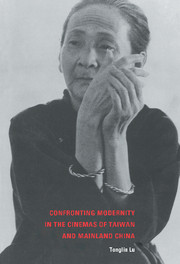Book contents
- Frontmatter
- Contents
- List of Illustrations
- Acknowledgments
- Introduction
- PART I ON THE CULTURAL AND IDEOLOGICAL MARGINS
- PART II IN SEARCH OF TRADITION IN THE MIDST OF MODERNIZATION
- 3 From a Voiceless Father to a Father's Voice
- 4 Melodrama of the City
- PART III THE THIRD-WORLD INTELLECTUAL IN THE ERA OF GLOBALIZATION
- Epilogue
- Notes
- Glossary
- Bibliography
- Filmography
- Index
3 - From a Voiceless Father to a Father's Voice
Published online by Cambridge University Press: 12 January 2010
- Frontmatter
- Contents
- List of Illustrations
- Acknowledgments
- Introduction
- PART I ON THE CULTURAL AND IDEOLOGICAL MARGINS
- PART II IN SEARCH OF TRADITION IN THE MIDST OF MODERNIZATION
- 3 From a Voiceless Father to a Father's Voice
- 4 Melodrama of the City
- PART III THE THIRD-WORLD INTELLECTUAL IN THE ERA OF GLOBALIZATION
- Epilogue
- Notes
- Glossary
- Bibliography
- Filmography
- Index
Summary
Jiao Xiongping, a leading Taiwan film critic, writes, “Hou Xiaoxian has constantly tried [in his films] to search for an origin of Taiwan history.” If we look closely at his films, however, we have the impression that this origin has much stronger connections with his personal experiences than with a general sense of national history. At the same time, in a different context personal experiences are not necessarily in conflict with what Jiao calls national identity, since Hou Xiaoxian, whose family immigrated to Taiwan during the late 1940s, shares an ambiguity toward his own identity with a great number of “mainlanders” (waisheng ren), despite his close ties to the regional culture. Literally, waisheng ren means “outsiders to the [Taiwan] province,” although these so-called outsiders have resided in Taiwan for half a century. Originally, both mainlanders and the Taiwanese (bensheng ren) were from China, the only difference being their date of arrival, either before or after the Japanese occupation. This artificial line of demarcation was used to justify the minority rule of the Nationalist government over the majority of Taiwanese at the beginning of its power, since the Taiwanese had supposedly been “enslaved” (nuhua) by the Japanese colonizers for half a century.
Furthermore, the Nationalist government, initially led by recent mainland immigrants, considered Taiwan culture to be an insignificant part of the great Chinese tradition. In the past, few officially sponsored scholarly works have been devoted to regional history, whereas a great number of them have contributed to Confucian, Daoist, Buddhist, and traditional Chinese historical studies in Taiwan.
- Type
- Chapter
- Information
- Publisher: Cambridge University PressPrint publication year: 2001

